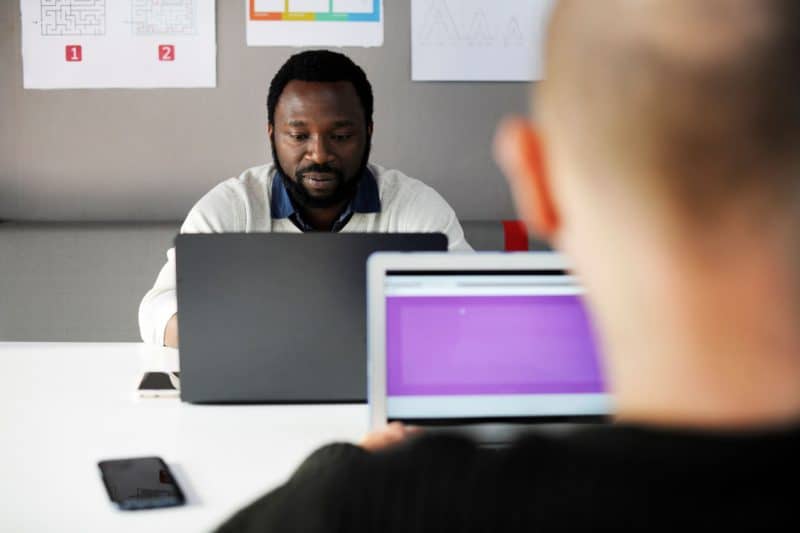
Could you squeeze in an extra desk or two in your business? It could be an extra line of income for you. Photo via Pexels.
With more people working remotely, more people are working from places that are neither their offices or their homes. Cue the rise of the Third Workplace.
You may remember “third places” as places you hangout that aren’t home and aren’t work. Coffee shops, bars and places like that. “Third workplaces” are places you work that aren’t home and aren’t the office.
Since rural places host a lot of professionals working from the field, we’ve long had people who wanted temporary and flexible places to work. What we haven’t had was much supply. Now with more remote work and more entrepreneurship, we expect to see more people looking for places to work. That’s a business opportunity.
Any small town or rural business could potentially create a new line of income from any space that could be adapted for a third workspace to rent out.
Adding additional lines of income is one of the Small Town Rules: always have more than one line of income.

All kinds of small town businesses have extra workspace, including the tire store. Photo by Jon Swanson
The larger trend
Of course this is all about remote work, whether it’s current residents or people moving to rural places working online. The pandemic accelerated this, and it’s still going.
- People who may want a change of scene from their home office.
- People may crave more work interaction than they get at home.
- People may want to feel part of the larger business community.
- People who work from an office might benefit from getting away for some focused work.
One of our favorite trendwatchers, Emergent Research said:
We’re seeing signs that, thanks to the shift to remote work, the paradox of place is breaking down and workers and companies are geographically spreading out. We expect both the trends towards greater use of 3rd places for work and economic de-agglomeration to continue.

Have some extra reception space? Even couches or soft seating can be office-like enough for a third workspace. Photo by WOCinTech.
What would you need to set up a workspace?
- Chairs or places to sit are good.
- Desks or tables would be nice.
- Wifi would help.
Pretty much everything else is negotiable.
Even wifi, which feels like an absolute requirement, can be flexible. If your wifi isn’t great, some workers may have a wireless hotspot they can use. (But still, faster and more reliable wifi would be better.)
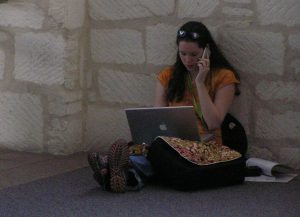
The basic amenities are chairs and work surfaces, because otherwise remote workers will make do with almost nothing. Photo by Becky McCray.
Even if other co-working places exist in your town, you can still create your own third workspace with your own personality. Different people will like different kinds of workplaces.
Some people want a noisy coffee shop. Some will like quiet libraries. Some want a more homey place, and others will feel more business-like in an office-style setting. Whatever the feel of the work space you create, there is someone who will love it.

Are guest rooms going empty? Those are potential workspaces. Photo by C.C. Chapman.
What businesses could make money from extra workspace?
Coffee shops, cafes and food businesses have long been used as informal workspaces. What if you made a just slightly upgraded workspace for an extra charge?
Business incubators could create office space and co-working space.
Hotels, motels or bed and breakfasts may already offer a workstation or two for guests. Could you expand the workstation to accommodate regular co-working? Could you rent guest rooms as temporary offices?
RV Parks, too.
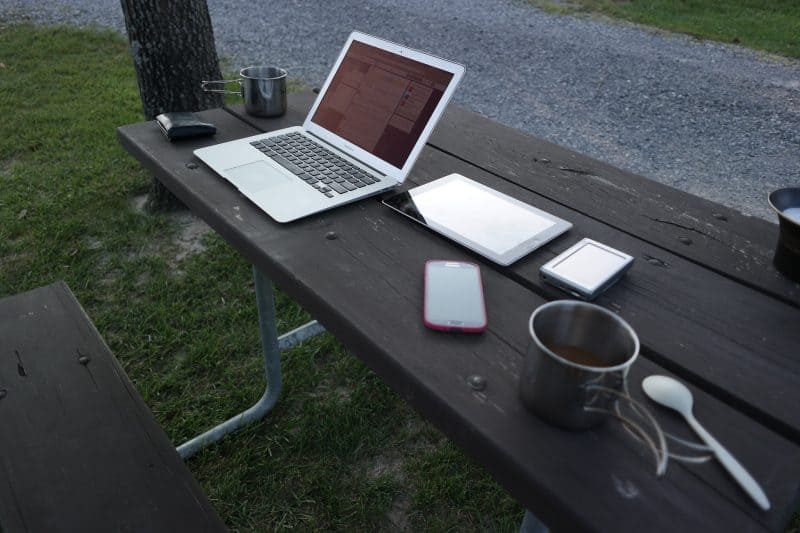
Outdoor workspaces including parks, yards, porches and RV parks have income-producing potential. Photo by C.C. Chapman.
Any business with room for an extra desk or office. Maybe an insurance company has some open space in their offices. Maybe an attorney has an extra partners office they only use for storage.
Nonprofit organizations, economic development groups or chambers may have offices or meeting rooms that aren’t in use all the time.
Churches, worship centers, fellowship halls, or youth centers may have classrooms or offices they could share.
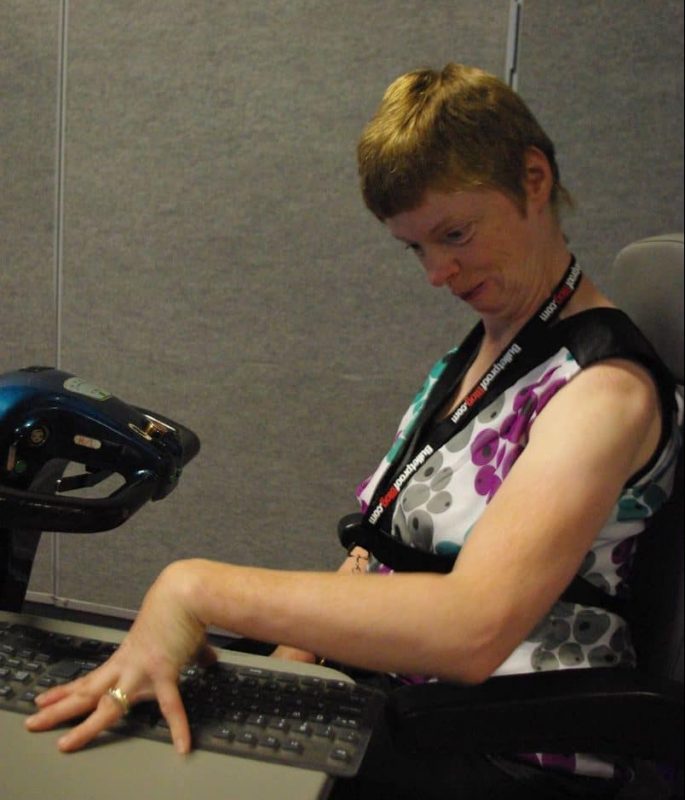
If your space is accessible by wheelchairs or people with mobility issues, you can serve more people. Glenda Watson Hyatt who uses a wheelchair brings her own roll-up keyboard that’s easier for her to use when working. Photo by Becky McCray.
Two real life examples: bringing clients in, and The Smoffice
What to look for: empty space or storage space in any businesses’ office
Mike Samson, co-founder of crowdSPRING, said they partnered with a design development firm, and the deal included a tiny amount of office space. This worked for them for nine months before they outgrew it.
Samson said there is a big difference between working at home, and working with other people who have ideas, connections, networks, and can invite you to events. We’ll talk more about the benefits of third workplaces, below.

Deep display windows downtown can turn into small offices. Photo courtesy of The Smoffice.
What to look for: deep display windows downtown going empty: The Smoffice
In Durham, North Carolina, a local coffee shop had big display windows up front they weren’t sure how to use. So they turned one into a small office space. They called it The Smoffice, and held a contest to find a tiny entrepreneur that wanted to use it. Everyone benefited from the publicity, and the two businesses actually interacted and helped each other while they were located together.
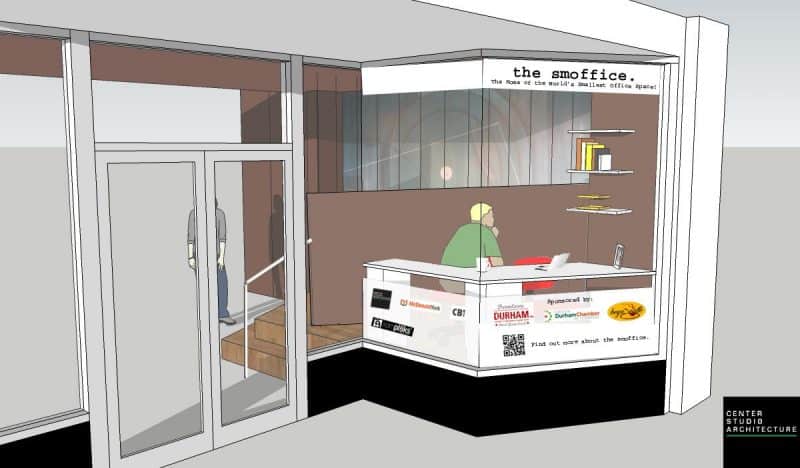
Deep display windows downtown can turn into small offices. Rendering courtesy of The Smoffice.
Bonus Points: Third workspaces bring side benefits to workers, entrepreneurs and the community
Better workers: When people who usually work from home do some of their work from a co-working space, Emergent Research said that they feel more engaged and motivated, they expand their professional networks and feel more successful.
Better entrepreneurs: Entrepreneurs learn best from each other. When they’re in close proximity, they have opportunities to run into each other randomly. They’ll talk to each other, answer questions for each other, come up with ways they might work together or potential customers they might refer to each other.
Better community: When people who work from home or remotely meet at these third workspaces, they’ll start to build connections. That’s an essential part of building community and social capital.
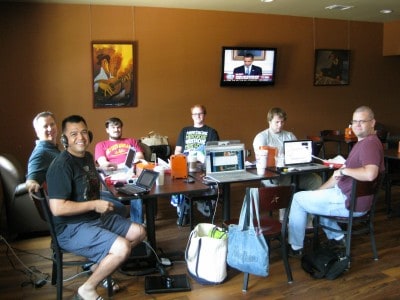
Coworking groups and clubs can form in shared workspaces. that helps build beneficial social capital in your community. Photo by Sheila Scarborough.










